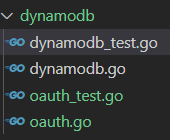我們今天要來寫code測試Local的DynamoDB,我們找一個實際的例子來測試,目前想到會有需要存的就是使用者Google OAuth的token,我們不會希望每次要調用Google Drive的時候,都一直要你登入google進行授權,因此我們會把授權成功後拿到的token資訊存到DynamoDB去。
首先第一步就是開一個資料夾,建立4個檔案,dynamodb.go放一些操作dynamodb通用的一些function,oauth.go放處理剛剛說的token的相關方法,並建立對應的Unit test。

接著到oauth.go建立GoogleOAuthToken的struct,關於如何取得真正的token,我們到真的處理Google OAuth的部份在說明,今天先確保到DynamoDB沒問題就好。
// oauth.go
type GoogleOAuthToken struct {
PK string `dynamodbav:"PK"`
AccessToken string `dynamodbav:"access_token"`
TokenType string `dynamodbav:"token_type"`
RefreshToken string `dynamodbav:"refresh_token"`
Expiry string `dynamodbav:"expiry"`
}
知道我們要操作的結構後,我們回到dynamodb.go,創建TableBasics最為基礎結構
// dynamodb.go
package dynamodb
import (
"context"
"errors"
"fmt"
"log"
"github.com/aws/aws-sdk-go-v2/aws"
"github.com/aws/aws-sdk-go-v2/config"
"github.com/aws/aws-sdk-go-v2/credentials"
"github.com/aws/aws-sdk-go-v2/service/dynamodb"
"github.com/aws/aws-sdk-go-v2/service/dynamodb/types"
)
type TableBasics struct {
DynamoDbClient *dynamodb.Client
TableName string
}
func NewTableBasics(tableName string) *TableBasics {
cfg, err := config.LoadDefaultConfig(context.TODO())
if err != nil {
panic(err)
}
client := dynamodb.NewFromConfig(cfg)
return &TableBasics{
DynamoDbClient: client,
TableName: tableName,
}
}
下面加上CreateLocalClient,建立一個連線到地端的*dynamodb.Client,如果是平時在本機端開發,我們使用這個function得到的Client
// dynamodb.go
func CreateLocalClient(port int) *dynamodb.Client {
cfg, err := config.LoadDefaultConfig(context.TODO(),
config.WithRegion("ap-northeast-1"),
config.WithCredentialsProvider(credentials.StaticCredentialsProvider{
Value: aws.Credentials{
AccessKeyID: "dummy", SecretAccessKey: "dummy", SessionToken: "dummy",
Source: "Hard-coded credentials; values are irrelevant for local DynamoDB",
},
}),
)
if err != nil {
panic(err)
}
dsn := fmt.Sprintf("http://localhost:%d/", port)
return dynamodb.NewFromConfig(cfg, func(o *dynamodb.Options) {
o.BaseEndpoint = aws.String(dsn)
})
}
接著打開dynamodb_test.go,我們將其作為測試的主要進入口(TestMain),建立一個TableBasics結構,其中TableName存"google-oauth”,再把原本的DynamoDbClient替換成CreateLocalClient產生的,讓他連線到我們昨天開在8000port的local dynamodb,這樣之後其他unit test直接操作初始化好的testTableBasics就好了~
// dynamodb_test.go
package dynamodb
import (
"os"
"testing"
)
var testTableBasics *TableBasics
func TestMain(m *testing.M) {
// google_oauth
testTableBasics = NewTableBasics("google-oauth")
// change to local dynamodb
testTableBasics.DynamoDbClient = CreateLocalClient(8000)
os.Exit(m.Run())
}
再來回到oauth.go,補上建立table的方法 (從TableBasics拿出TableName,調用DynamoDbClient.CreateTable來建立table)
//oauth.go
package dynamodb
import (
"context"
"log"
"time"
"github.com/aws/aws-sdk-go-v2/aws"
"github.com/aws/aws-sdk-go-v2/feature/dynamodb/attributevalue"
"github.com/aws/aws-sdk-go-v2/feature/dynamodb/expression"
"github.com/aws/aws-sdk-go-v2/service/dynamodb"
"github.com/aws/aws-sdk-go-v2/service/dynamodb/types"
)
type GoogleOAuthToken struct {
PK string `dynamodbav:"PK"`
AccessToken string `dynamodbav:"access_token"`
TokenType string `dynamodbav:"token_type"`
RefreshToken string `dynamodbav:"refresh_token"`
Expiry string `dynamodbav:"expiry"`
}
func (basics TableBasics) CreateGoogleOAuthTable() (*types.TableDescription, error) {
var tableDesc *types.TableDescription
table, err := basics.DynamoDbClient.CreateTable(context.TODO(), &dynamodb.CreateTableInput{
AttributeDefinitions: []types.AttributeDefinition{
{
AttributeName: aws.String("PK"),
AttributeType: types.ScalarAttributeTypeS,
},
},
KeySchema: []types.KeySchemaElement{{
AttributeName: aws.String("PK"),
KeyType: types.KeyTypeHash,
}},
TableName: aws.String(basics.TableName),
ProvisionedThroughput: &types.ProvisionedThroughput{
ReadCapacityUnits: aws.Int64(10),
WriteCapacityUnits: aws.Int64(10),
},
})
if err != nil {
log.Printf("Couldn't create table %v. Here's why: %v\n", basics.TableName, err)
} else {
waiter := dynamodb.NewTableExistsWaiter(basics.DynamoDbClient)
err = waiter.Wait(context.TODO(), &dynamodb.DescribeTableInput{
TableName: aws.String(basics.TableName)}, 5*time.Minute)
if err != nil {
log.Printf("Wait for table exists failed. Here's why: %v\n", err)
}
tableDesc = table.TableDescription
}
return tableDesc, err
}
接著我們將PK設計為Line的User UUID,因此我們會在碰到PK的地方都加上"LINEID#”的prefix,然後補上對應的CRUD就好哩
//oauth.go
const PK_PREFIX_LINE = "LINEID#"
// Get PK Key (with Line prefix)
func (tok GoogleOAuthToken) GetKey() map[string]types.AttributeValue {
// Add prefix to PK
line_userid, err := attributevalue.Marshal(PK_PREFIX_LINE + tok.PK)
if err != nil {
panic(err)
}
return map[string]types.AttributeValue{"PK": line_userid}
}
新增GoogleOAuthToken
//oauth.go
func (basics TableBasics) AddGoogleOAuthToken(tok GoogleOAuthToken) error {
tok.PK = PK_PREFIX_LINE + tok.PK
item, err := attributevalue.MarshalMap(tok)
if err != nil {
panic(err)
}
_, err = basics.DynamoDbClient.PutItem(context.TODO(), &dynamodb.PutItemInput{
TableName: aws.String(basics.TableName), Item: item,
})
if err != nil {
log.Printf("Couldn't add item to table. Here's why: %v\n", err)
}
return err
}
更新GoogleOAuthToken
//oauth.go
func (basics TableBasics) TxUpdateGoogleOAuthToken(tok GoogleOAuthToken) (*dynamodb.TransactWriteItemsOutput, error) {
var err error
var response *dynamodb.TransactWriteItemsOutput
update := expression.Set(expression.Name("refresh_token"), expression.Value(tok.RefreshToken))
update.Set(expression.Name("access_token"), expression.Value(tok.AccessToken))
expr, err := expression.NewBuilder().WithUpdate(update).Build()
if err != nil {
log.Printf("Couldn't build expression for update. Here's why: %v\n", err)
} else {
twii := &dynamodb.TransactWriteItemsInput{
TransactItems: []types.TransactWriteItem{
{
Update: &types.Update{
Key: tok.GetKey(),
TableName: aws.String(basics.TableName),
ExpressionAttributeNames: expr.Names(),
ExpressionAttributeValues: expr.Values(),
UpdateExpression: expr.Update(),
},
},
},
}
response, err = basics.DynamoDbClient.TransactWriteItems(context.TODO(), twii)
if err != nil {
log.Printf("Couldn't trasnaciton update tok %v. Here's why: %v\n", tok.PK, err)
}
}
return response, err
}
取得GoogleOAuthToken
//oauth.go
func (basics TableBasics) GetGoogleOAuthToken(line_userid string) (GoogleOAuthToken, error) {
tok := GoogleOAuthToken{PK: line_userid}
response, err := basics.DynamoDbClient.GetItem(context.TODO(), &dynamodb.GetItemInput{
Key: tok.GetKey(), TableName: aws.String(basics.TableName),
})
if err != nil {
log.Printf("Couldn't get info about %v. Here's why: %v\n", line_userid, err)
} else {
err = attributevalue.UnmarshalMap(response.Item, &tok)
if err != nil {
log.Printf("Couldn't unmarshal response. Here's why: %v\n", err)
}
}
return tok, err
}
到這邊基本的操作就寫好了,我們到oauth_test.go來測試一下,執行單個個別的測試,可以配合昨天http://localhost:8001/ 上的GUI看一下效果,確認一下都有正確的執行就沒問題摟~
// oauth_test.go
package dynamodb
import (
"testing"
"github.com/stretchr/testify/assert"
)
func TestCreateGoogleOAuthTable(t *testing.T) {
tableDesc, err := testTableBasics.CreateGoogleOAuthTable()
t.Log("tableDesc:", tableDesc)
t.Log("ERROR:", err)
assert.NoError(t, err, "Expected no error creating table")
assert.NotNil(t, tableDesc, "Table description should not be nil")
}
func TestAddGoogleOAuthToken(t *testing.T) {
tok := GoogleOAuthToken{
PK: "test1234",
AccessToken: "test123",
TokenType: "Bearer",
RefreshToken: "test123",
Expiry: "2023-09-24T11:31:54.2936004+08:00",
}
err := testTableBasics.AddGoogleOAuthToken(tok)
if err != nil {
t.Log("ERROR:", err)
}
}
func TestTxUpdateGoogleOAuthToken(t *testing.T) {
tok := GoogleOAuthToken{
PK: "test1234",
AccessToken: "test123456",
RefreshToken: "test123456",
}
output, err := testTableBasics.TxUpdateGoogleOAuthToken(tok)
t.Log("output:", output)
if err != nil {
t.Log("ERROR:", err)
}
}
func TestGetGoogleOAuthToken(t *testing.T) {
tok, err := testTableBasics.GetGoogleOAuthToken("test1234")
if err != nil {
t.Log(err)
}
t.Log("Get Token:", tok)
}
